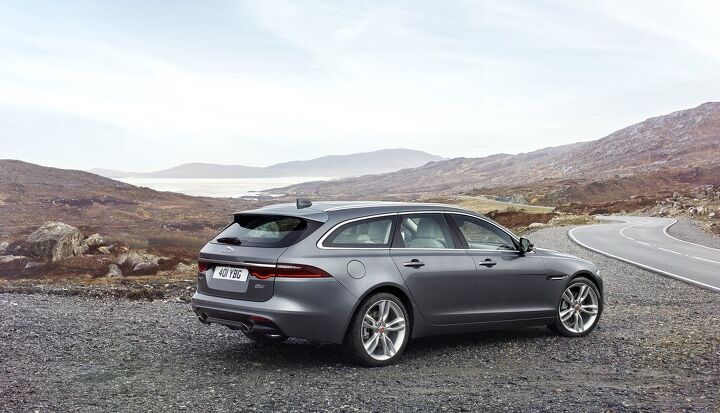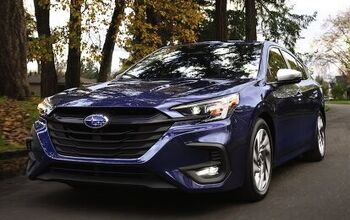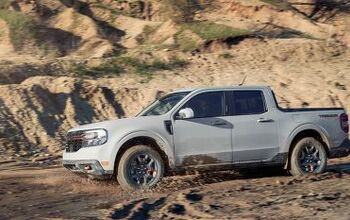British Invasion, Part 2: Jaguar Land Rover Sales Soar in U.S., No Thanks to Cars

It’s odd that distinctly British popular music dried up around the time the last vestiges of British Leyland disappeared from the nation. Rover Group bit the dust at the turn of the century, with its associated nameplates finding new homes in unlikely places.
Perhaps we have cumbersome, money-losing car conglomerates to thank for New Wave and Britpop. Maybe the Spice Girls killed everything. Who knows.
Jaguar and Land Rover, having once shared the same BL umbrella, were already orphans by that time, ultimately finding each other again thanks to the temporary love of foster parent Ford. Now owned by India’s Tata Motors and nowhere near as financially dodgy, Jaguar Land Rover is on a product tear. It’s these new models you can thank for the automaker’s record sales year in 2017 — both globally and in the United States.
Don’t thank traditional sedans.
Globally, JLR’s 2017 volume surpassed 2016 — another record year — by 7 percent. The Jaguar brand recorded a 20 percent uptick in global sales, with Land Rover posting a 2 percent increase. In the U.S., rising sales of both brands saw JLR carve out a 9 percent volume increase. The growth was split between Jaguar (up some 27 percent) and Land Rover (up 1 percent).
However, it’s not a continued love for all models across the range that’s boosting sales. Indeed, Jaguar’s sedans posted steep slumps in December. The compact XE, arriving at U.S. dealers in May 2016, ended its first full year on the market with an understandable year-to-date sales increase. Still, December brought a 39.2 percent year-over-year sales decline.
The midsize XF sank 29 percent last month — its fourth December decline — ending the year with a volume loss of 31.7 percent. The stately XJ fared no better, falling 39.7 percent in December. Total volume for 2017 was 29 percent lower than 2016’s figure.
In the sporting category, there was a true increase to be found with the F-Type, but not much of one. December sales rose 0.8 percent, year-over-year — meaning three extra buyers took home an F-Type. For the year, sales rose 0.96 percent, but let’s round that up to 1 percent in the interest of charity.
It was the F-Pace SUV that really brought home Jag’s bacon last year. Introduced in May 2016, the F-Pace’s first full year, coupled with first-full-year XE sales, delivered that impressive growth number. Sales have since reached a plateau, but the arrival of the smaller E-Pace SUV early this year should add significant volume to the brand’s balance sheet. The confusingly named I-Pace electric SUV will tempt green buyers not longer after that.
A bevy of fresh faces raised Land Rover’s fortunes in 2017. The next-generation Discovery arrived mid-year, replacing the boxy and beloved LR4 and sending Disco sales into the lower stratosphere. Discovery sales rose 173.2 percent in December. The lookalike Discovery Sport saw its sales drop 11.6 percent last month, for a year-to-date decline of less than half a percent.
Land Rover’s growing Range Rover family welcomed the Velar late last year, adding some 6,152 sales to the brand’s tally. The classic, top-flight Range Rover saw its sales rise 4.4 percent in the U.S. in 2017, while the Range Rover Sport watched its sales tumble 11.4 percent in a slowly declining market. Meanwhile, the aging Evoque lost 18 sales in December, year-over-year, but closed out 2017 with a sales gain of 8.2 percent.
Looking at these figures, it’s a head-scratcher as to why Land Rover thinks the Range Rover name could do with a non-traditional vehicle, perhaps even a sedan.
[Image: Jaguar Land Rover]

More by Steph Willems
Latest Car Reviews
Read moreLatest Product Reviews
Read moreRecent Comments
- FreedMike Sounds like an excellent way to waste a ton of money.
- Theflyersfan 175K what...miles? Kilometers? Yards? Is this the one Land Rover in the universe that made it over 100,000 under its own power? I'd be too afraid to drive it daily. Just waiting for the first dash light - it always starts with just one - before the Christmas tree lights up, something sputters or stumbles, and then you're on the side of the road, miles from nowhere, with the toxic smell of frying electronics spewing from each vent. If you and your loved ones are into unplanned surprises and pain, go for it. If a beach vacation in Somalia mixed in with some overland trekking in Chechnya is your idea of best vacation ever, we have a vehicle for you. If you think your local Land Rover dealer has the best coffee in town, and you don't mind hours of HGTV on their waiting room TV, go for it. Just update your Facebook page regularly as the rest of us want to read the carnage.
- Ajla While this won't be a GX460, it probably isn't any worse a purchase than a Lincoln or Cadillac.
- 1sowa Its clearly the "Honda Anyone"
- Oberkanone Nope. Never. Run away. Unreliable money pit.




































Comments
Join the conversation
If tailgate to front seatbacks are 6+ feet, the floor with rear seats folded is flat, and it comes with some semblance of a tow rating, that wagon will be a great car for hauling a Thruxton to track weekends at faraway tracks..... OTOH, if you can't fit a decent mattress flat in the back of it, I'd rather just get a sedan.
It's uncanny how similar the XE looks to the old XF.